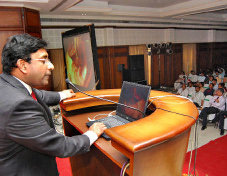
Tamilnadu leading in altruistic cadaver liver donation

K.Ravindranath, chairman, Global Hospitals and Mohamed Rela, Liver Transplant specialist,
were addressing a press conference Chennai on Sunday.
They said that liver transplantation scene in
He said that good liver transplants were able to provide a one-year
survival in 90 per cent of cases (75 per cent of cases with acute liver
failure), a five-year survival rate for 85 per cent of patients and a 10-year
survival rate in about 70 per cent of cases.
Apart from medical expertise and technological advances, the enormous
changes in the transplantation scenario were also due to the raised awareness
leading to more cadaver and living donor transplants, Dr. Rela said. Tamil
Nadu, especially Chennai, was the forerunner for altruistic cadaver liver
donation, and the mobilization of the organized sector of the government was
now a model for other States, he said.
�In terms of long-term survival of ten years or longer, results with
liver transplantation are better than that with renal transplants,� Dr. Rela
said.
While liver transplants now cost about Rs.22 lakh for adults and half
that amount for children, the usage of immunosuppressants could be tapered
down, leading to lesser post-transplant costs, he said.
Pointing to liver cancers as among the most common causes of liver
disease, Dr. Rela said the lack of screening was leading to patients presenting
with fairly advanced cancers.
Later, addressing a scientific session, Dr. Rela said transplants could
be offered for benign liver tumours, which if left unattended could be lethal
through �mass effect than metastasis.�
In a condition like hepatoblastoma - an important liver tumor in
children � the worldwide experience has been that any tumor that does well with
chemotherapy did well with resection. However, pre-operative chemotherapy is an
important intervention prior to resesection procedure.
On hepatocellular carcinoma, which was one of the most common cancers,
Dr. Rela said it was important to appreciate the condition as two diseases
rolled into one with both having different prognosis.
While resection, chemo-embolisation, radio frequency ablation and liver
transplantation were among the available options to treat liver cancers, one of
the problems in







